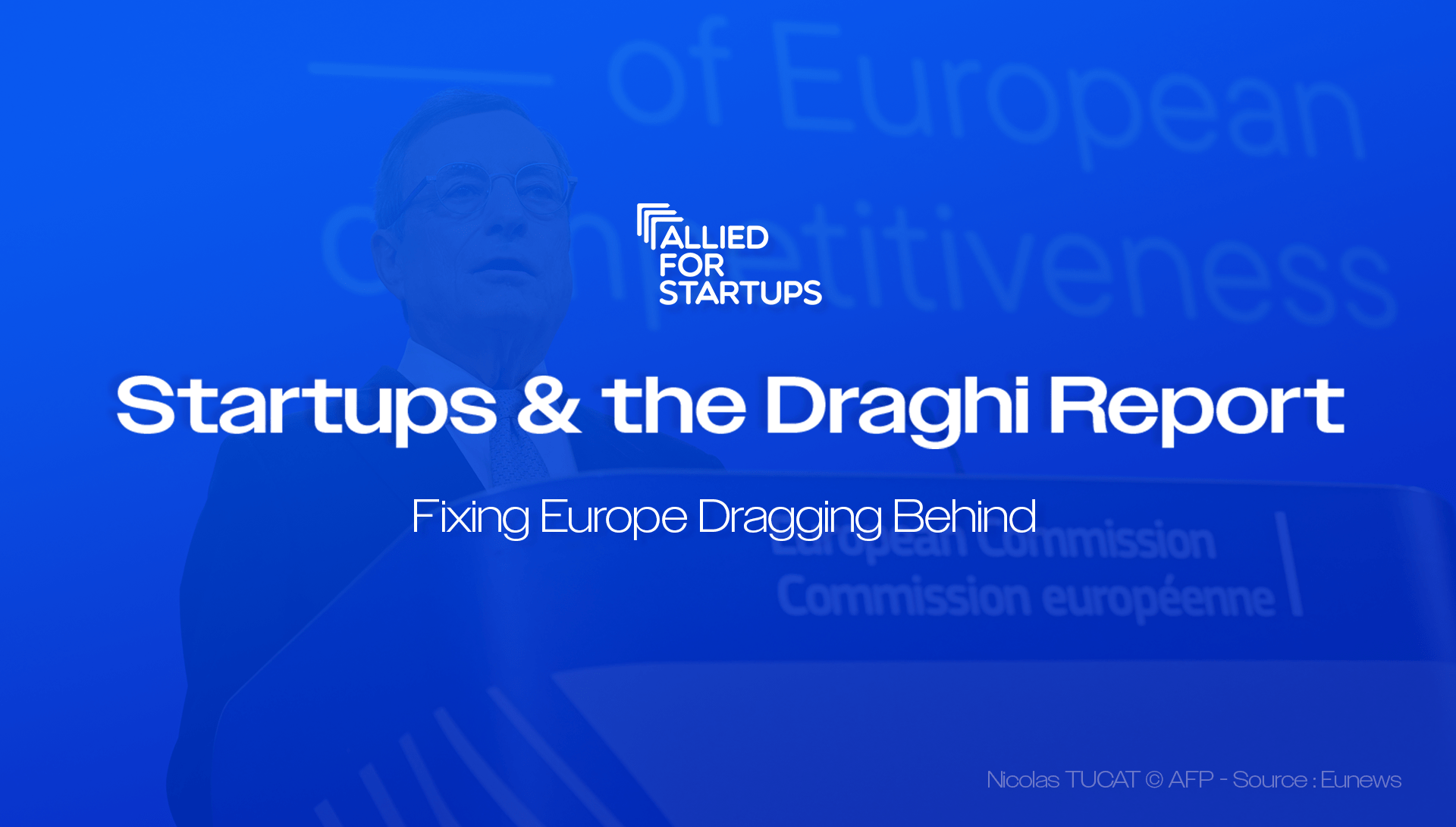Startups & the Draghi Report: Fixing Europe Dragging Behind
Introduction
On 9 September, former Italian PM and former head of the European Central Bank Mario Draghi’s much-anticipated report on the future of EU competitiveness was published, calling for “radical change” to the European economy. In the report, Draghi underscores the urgency for swift and decisive action. He highlights the need for increased collaboration and a €800 billion EU investment to drag itself out of its current slump of low productivity and growth. Without such bold measures, Draghi warns, the EU risks falling further behind global competitors like China and the US.
But what does this all mean for startups? In his report, Draghi outlines three key areas for enhancing European competitiveness and strengthening the startup and scale-up ecosystems across the continent. Let’s take a closer look!
Area #1 Innovation, Innovation, Innovation
Mario Draghi argues that Europe must transform into a hub where innovation thrives. This is particularly important in the tech sector, as it’s a main driver of productivity but an area in which the EU lags behind the most. For instance, while the US economy is more productive overall, with incomes growing at twice the rate of those in the EU, the picture changes when big tech is excluded—now, the EU is actually better in productivity. As a result, closing the innovation gap compared to the US is essential for Europe’s long-term growth. This highlights why Draghi strongly advocates for placing research and innovation at the core of EU strategic priorities. Great news for startups!
He goes on to identify several root causes behind Europe’s weak innovation performance. These include lower and less effective R&D spending, a fragmented EU innovation ecosystem, and an underdeveloped financial system to support the scale-up of innovative companies. As he mentions in the report, this has resulted in 30% of European unicorns having relocated their headquarters abroad.
Good news is that the EU remains strong in scientific research and produces patents at a rate comparable to the US. Unfortunately, this has not translated into significant ‘high-tech’ R&D advancements. To address this, Draghi calls for closing the skills gap, dismantling regulatory barriers, and integrating the 27 distinct research and innovation ecosystems across Europe. With these measures, Draghi aims to create a more unified environment for innovation, helping Europe retain both its talent and its startups, ultimately benefiting the union as a whole.
Area #2 A New Investment Landscape
However, this won’t be cheap. Closing the innovation gap, Mario Draghi argues, will require a substantial investment—€800 billion to be precise. However, the EU must act quickly, as it is already dragging behind significantly. For example, the EU accounts for just 5% of global venture capital funds raised, compared to 52% in the US and 40% in China.
Draghi points to fragmented capital markets, an over-reliance on bank financing, and a small risk averse EU budget as key factors behind the weak investment climate in Europe. To address these challenges, he calls for the creation of a robust EU Capital Markets Union, supported by pension assets, and modelled after the successes seen in some EU Member States. Achieving this will require harmonising insolvency frameworks, eliminating tax barriers to cross-border investment, and strengthening the EU budget to allow direct funding for priority projects. Implementing these reforms, such as the Capital Markets Union, could dramatically improve the investment environment, enabling Europe to support innovative startups and foster sustained economic growth.
Area #3 Increased Collaboration and Effective Regulation
Won’t this require substantial collaboration among EU Member States? Yes, it will, and Mario Draghi is clear that without changes to the functioning of the EU itself, these efforts will not succeed. He emphasises that Europe’s decision-making processes have remained stagnant, even as the Union has expanded and the global environment has become more challenging.
Addressing these issues, Draghi proposes the creation of a “Competitiveness Coordination Framework” to promote EU-wide policy cooperation. This framework would focus exclusively on strategic priorities at the EU level, such as innovation, and work to streamline processes across the EU.
A key objective of this framework could be to reduce the regulatory burden on European companies. This concern is especially relevant for startups, which face disproportionately high regulatory hurdles, impacting their ability to scale and innovate. To overcome this, Mario Draghi suggests a new EU-wide legal status for innovative start-ups, an innovation criteria for public procurement, and a system to evaluate the regulatory costs placed on startups. The collaboration and implementation of these reforms will be essential in creating a more dynamic and competitive environment for startups across Europe.
Conclusion
To conclude, for the startup ecosystem, this report could truly be a game-changer! While it doesn’t place sufficient emphasis on the need for a 28th regulatory regime for companies operating within the Single Market, it strongly highlights the solutions Allied for Startups has long advocated for. These include, prioritising research and innovation, fostering a more favourable regulatory environment, and achieving a Capital Markets Union. This will not only make Europe more attractive for innovation and entrepreneurship, but subsequently boost the EU’s competitiveness, growth and overall prosperity. All great things for startups!

